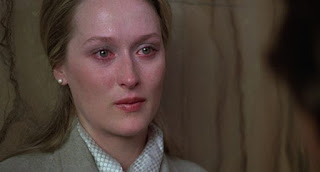 I have to admit that this isn't one that fills me with great excitement. I'm pretty sure I've seen it before - but all I really remember is some reckless driving on a beach and a lot of crying. In my head I'm definitely mixing up some of the ending with Beaches (which is a film that I really can't stand...) but I know there's a lot of crying and a young woman dying of cancer. Which is probably a plot point that applies to more than just those two films.
I have to admit that this isn't one that fills me with great excitement. I'm pretty sure I've seen it before - but all I really remember is some reckless driving on a beach and a lot of crying. In my head I'm definitely mixing up some of the ending with Beaches (which is a film that I really can't stand...) but I know there's a lot of crying and a young woman dying of cancer. Which is probably a plot point that applies to more than just those two films.The 80s winners do appear to be falling into one of two categories - big, sweeping historical dramas (Chariots of Fire and Gandhi, so far) and small, intimate portrayals of ordinary American life (Ordinary People and this one, so far).
I like Jack and Shirley - and they were both superb in their previous Oscar-winning films (if we forget about Around The World in 80 Days....). Whatever they are given to do, they are likely to do it very well. I'm just not sure how much I'm going to be interested in what they are given to do in this one....
April 9th 1984 at the Dorothy Chandler - and we're back to Johnny Carson as host again this year. From the clips I've seen of him hosting, this was a very good move! Here's the Opening Sequence (with bonus Shirley Temple at the end!) so you can decide for yourself:
Other Notable Winners That Night:
Jack and Shirley got the other two awards for Terms of Endearment and Robert Duvall took Best Actor for Tender Mercies.
Probably the most interesting winner of the night was Linda Hunt, who won Best Supporting Actress for playing an Asian Male part in The Year of Living Dangerously, becoming the first person to win an Oscar for playing a character of the opposite sex. For several reasons, this sort of casting would be very unlikely today - and certainly wouldn't be winning any awards!
Best Song:
Yet another absolute classic of a song (although the film itself is nowhere near as good as its soundtrack). Although I'm just as fond of Maniac - which was also nominated - this one is the worthy winner, and means that Irene Cara has two Oscar winning singles to her name!
What We Could/Should Have Been Watching:
 |
| Getting the rhyme wrong..... |
Among the other films out there were Fanny and Alexander (which won Best Foreign Language Film), Silkwood, Yentl, Return of the Jedi and Educating Rita. Fanny and Alexander is probably the best of these, objectively. Jedi is the most successful. But I think Educating Rita would be my personal pick!
Our Verdict:
 |
| The three leads - the reason the film works |
It was very much sold on (and remembered by) the two ideas of the central Shirley-Jack romance and the dying daughter. Both of these things are here - and both of them are much better that I thought/remembered.
 |
| Not something you see very often on Fleetwood beach! |
 |
| Everybody needs good neighbours...... |
However, the story isn't about Aurora and Garrett. It isn't even about daughter Emma and her husband Flap (told you it's a film of silly names!). It's essentially about Aurora and Emma and their strained yet solid relationship. Neither of them are perfect or even right most of the time. And there are several places in the story where they are each allowed to be downright unlikeable. But they are always there for each other - especially when Emma becomes sick. Debra Winger plays the part of Emma really well and would have been a real contender for Best Actress if it wasn't for the force of nature that is Shirley MacLaine finally getting her overdue Oscar. Jeff Daniels does a good job as the unfortunately-named Flap and it was a nice surprise to see John Lithgow as Emma's extra-marital interest.
 |
| Actually not as much snotty crying as I expected - thankfully! |
Overall, Terms of Endearment was a better film than I thought it would be, but not as good a film as I would have liked it to be. It almost certainly resonated far more with Americans who were of a similar age as either Aurora or Emma - so not me then! Also, after two years of British triumph at the Oscars it's understandable that the Academy went for a slice of American life this time round. I'm glad we watched it, but I won't be rushing to watch it again in a hurry.










































